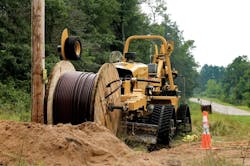The DOCSIS® 4.0 rollout represents the future of cable connectivity and today’s workforce needs to be ready with the knowledge necessary to upgrade cable operators’ access network architectures and stay ahead of the pace of consumers’ bandwidth consumption. This next iteration in the DOCSIS standard for data transfer over coaxial cable TV connections will allow cable companies to remain competitive with fiber. The trinity of focus at the foundation of today’s training is DOCSIS, construction and fiber.
Akin to the future of connectivity, the future of learning is founded in tech innovation. Training a workforce in today’s high output, the digital world demands easily digestible formats, like microlessons, or short training sessions that offer a broad view of industry topics, and hands-on simulations. From a holistic standpoint, we need to train the industry where they are. Training needs to be accessible everywhere and engaging to improve retention. Combinations of bootcamps, microlessons, and simulations, and the gamification of online learning represent the future of learning today.
Fiber and Construction
Current DOCSIS training provided by the Society of Cable Telecommunications Engineers (SCTE®), a subsidiary of CableLabs, does its best to do that.
Three courses relevant to those who want to excel in the cable industry are described below:
“From a holistic standpoint, we need to train the industry where they are. Training needs to be accessible everywhere and engaging to improve retention.”
Training the Workforce of the Future
As part of the Infrastructure Investment and Jobs Act, the FCC formed the Telecommunications Workforce Interagency Group to address the workforce needs of the telecom industry and its mounting labor challenges.
Working with industry leadership to solve real-world challenges, our teams create curriculums based on current job roles, specific job tasks, and required practical behaviors to empower future technologies. We’ve also established educational partnerships, colleges and universities including Dartmouth College, Cornell, and Georgia Tech. Through a combination of courses from SCTE and Fort Hays State University in Hays, Kansas, learners can earn an Associate of General Studies degree with an emphasis on Computer Networking & Telecommunications via FHSU Online. SCTE also recently partnered with Rio Salado College in Tempe, Arizona, to offer an Associate of Applied Science degree in Broadband Telecommunications.
In today’s world, broadband has become the great equalizer. Through the BEAD Program, the public and private sectors have joined forces to expand broadband connectivity across America, but this transformation is being hindered by a labor shortage.
Cable leaders must not only focus on attracting new employees to the industry, but also upskilling the existing workforce to support the global expansion of connectivity and technological innovation.
About the Author

Robin Fenton
VP, Membership and Learning Operations, SCTE®, a subsidiary of CableLabs®
Robin Fenton is the Vice President of Membership and Learning Operations at SCTE®, a subsidiary of CableLabs®, and the nonprofit member organization leading the acceleration and deployment of cable telecommunications technology. Fenton’s team develops and facilitates industry certifications and training courses for professionals at all levels of the cable industry. Learn more at https://www.scte.org/. Follow Robin on LinkedIn: https://www.linkedin.com/in/robinmfenton/. Follow SCTE on Twitter: https://twitter.com/SCTE, LinkedIn: https://www.linkedin.com/company/scte/, and Facebook: https://www.facebook.com/TheSCTE.




